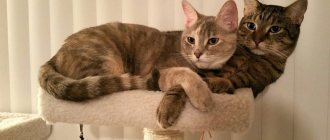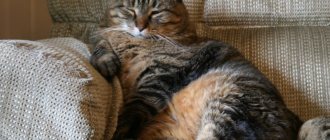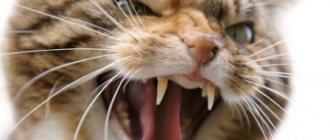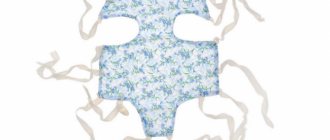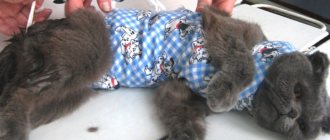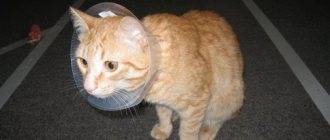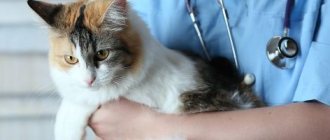Castration of animals is a simple surgical operation that involves removing the gonads in males and stopping reproductive functions. The operation is performed in a veterinary clinic or at home under general or combined anesthesia. If all rules are followed, animals do not experience any serious complications after castration. Moreover, the duration of the postoperative period largely depends on the correct actions of the owners. After the procedure, you need to pay attention not only to the health of the fluffy, but also to monitor the condition of the postoperative area. If a cat licks himself after castration and does it furiously and intensely, sutures may come apart. Bacteria can enter the wound, causing suppuration and causing acute inflammation.
What you need to know about castration
Castration is a simple and quick operation that takes no more than 20-30 minutes. But as after any surgical intervention, in order for the postoperative recovery period to pass without complications, the cat needs careful, delicate care and care.
Important! Any operation is a strong stress for the animal’s body, which can affect the condition and behavior of the pet.
If the operation went well, after about 30-40 minutes you will be able to take your pet home. Take care of a carrier, a basket, at the bottom of which place a disposable sterile diaper, clean flannel, or any other waterproof fabric. It is better to transport your cat not in public transport, as this can cause additional stress, but in a taxi or personal car.
Reasons for this behavior
How a pet endures the adaptation period after castration and recovers from anesthesia depends on the characteristics of its body and character. Animals, like people, can react to shocks in different ways. You also need to take into account that the cat does not understand what is happening and may be shocked the first time after the operation. During this period, he needs special attention and care.
Some pets, as soon as they recover from anesthesia, immediately return to their usual rhythm of life and do not show much concern. Others, on the contrary, may be stressed for several days.
The cat licks the eggs after castration, because he does not know any other way to eliminate unpleasant and painful sensations.
In addition, there may be other manifestations of the animal’s anxiety - for example, plaintive meowing or attempts to hide from people in a secluded place.
Is it possible to lick a wound?
Despite the fact that the saliva of our little brothers contains enzymes and substances that accelerate healing and tissue regeneration, it can also contain pathogenic microorganisms that will lead to the development of acute inflammation, suppuration, and infection. If a cat licks a wound, the natural healing process is disrupted.
In addition, the rough tongue of felines, especially with frequent intensive licking, can lead to sutures coming apart and bleeding. If a cat licks itself, treatment with antiseptics and disinfectants will not give the desired result and will increase the rehabilitation period. Therefore, you need to constantly monitor the cat and monitor the condition of the wounds daily.
Inspect the scrotum for signs such as redness, tenderness, and swelling. If blood oozes from the wound, severe bleeding has developed, the stitches have come apart, or greenish-yellow exudate is released, immediately contact your veterinarian and take your pet to the clinic. Make sure that no dirt gets into the wounds. If, for example, the postoperative area is contaminated with feces, clean the wound with warm water and a weakly concentrated solution of betadine. Dry the seam and lubricate it with antibacterial ointment.
Important! After surgery, consult with your surgeon regarding proper care.
If, in addition to licking, the cat shows restlessness, rushes around the apartment, tries to hide in dark secluded places, constantly meows pitifully and this behavior lasts more than two days, consult a veterinarian. It’s better to play it safe once again than to correct serious consequences later.
Consequences
And yet, is it possible for a cat to lick a wound after castration? There are two opinions on this matter. Some people believe that since your pet's saliva has healing properties, you can let him lick himself. However, veterinarians do not advise doing this for the following reasons:
- A rough tongue can damage the castration site, especially with intense licking. There are frequent cases of seam divergence.
- In addition to beneficial enzymes, saliva contains all kinds of microorganisms that can cause infection and suppuration of the wound.
- Treatment with disinfectants and healing agents will come to naught if the cat licks the castration site.
© shutterstock
The opinion of experts in this case is supported by weighty arguments, so it is necessary to do everything possible to prevent the animal from harming itself.
Postoperative area care
To prevent the cat from licking the wounds and gnawing on the stitches, after the cat has recovered from anesthesia, put on a protective cone (Elizabethan collar) for the pet. A similar accessory can be purchased at a veterinary clinic, pet stores, or veterinary pharmacy. If desired, you can make the collar yourself using cardboard, flexible durable plastic or thick fabric. Give preference to durable material, since the cat will try to pull it off in every possible way.
To ensure that the collar does not cause discomfort to the cat or hinder movement, it must be suitable for the pet in size.
You can also protect the postoperative area from licking by using baby diapers (for newborn babies). For convenience, cut a hole for the tail.
About the important
Under no circumstances should your pet be allowed to lick a post-operative wound! Along with saliva, hair and bacteria enter the wound canal. This can very quickly lead to the development of purulent inflammation. Considering its localization, this is extremely dangerous; in some cases, the inflammatory process can spread to the organs of the pelvic/abdominal cavities.
As soon as you notice that your operated pet has begun to regularly “slobber” the scrotal area, immediately (!) go to the veterinarian and ask for a surgical (“Elizabethan”) collar. This funnel-like device is placed around the cat's neck. They only take it off for eating. Wearing time is at least a week (but better - 14 days).
But what if neither your veterinarian nor the veterinary pharmacy simply has a surgical collar? You can do it yourself. To do this, you can take either a plastic bottle of the appropriate size, or ordinary cardboard (cutting it in a certain way). The homemade structure is secured to the animal’s neck using wide and soft ties. The difficulty is to securely fasten the surgical collar to the pet's neck (so that he does not throw it off), but not to choke the cat.
What to do when the cat licked the wound once and without consequences, but you want to prevent this behavior in the future without resorting to using a collar?
Hypothetically, applying some bitter substances that are unpleasant to the cat to the skin in the genital area will help cope with the pet’s unwanted behavior. Sometimes the solutions are very atypical. Thus, many foreign veterinarians recommend using Dimethyl phthalate . In general, this drug is a well-known antifungal agent, but its taste is so unpleasant for cats that the animal forgets for a long time about the idea of licking the wound.
In addition, you can immediately consult your veterinarian: today there are many products specifically created for such cases. The specialist will tell you what to do and how to use them correctly.
What to do if a cat licks a wound
If, nevertheless, the cat licked the wound, bleeding developed, or inflammatory swelling appeared, consult a veterinarian regarding further actions. The veterinarian will prescribe symptomatic medications for general and local treatment.
As a rule, complete healing of wounds after castration occurs on the 9-13th day . But if, nevertheless, the cat licked the wound, bleeding developed, or inflammatory swelling appeared, consult a veterinarian regarding further actions. The veterinarian will prescribe symptomatic medications for general and local treatment. Ranosan, Safroderm, Sanatol, Septogel, Levomikol, Iruksolone, and other wound-healing drugs are used. Before applying medications, the wound surface is treated with any antiseptic. In case of severe swelling, anti-inflammatory ointments, gels, and liniments with an antibacterial effect are used. If there is a suspicion of severe infection, the pet is prescribed a course of antibiotic therapy.
If you notice that your pet’s condition is worsening, or symptoms that are uncharacteristic of a healthy animal are noticeable, take the cat to a veterinary clinic or call a veterinarian at home.
Nuances of postoperative care
After castration, the cat needs to be properly cared for. The owner’s task includes not only treating the wound and preparing the correct diet, but also other equally important responsibilities on which the recovery process of the pet cat will depend.
Can a cat lick a wound?
The cat should not be allowed to lick the operated area. This can lead to sutures coming apart, bleeding, and wound infection. That is why it is recommended to wear a special collar, which can only be removed during meals under the watchful supervision of the owner.
Why can't you jump after castration?
In the first hours after the operation, the owner should monitor every movement of the cat, which has not yet recovered from anesthesia. The effect of anesthesia disrupts coordination of movement and disorients in space. Jumping from a height should not be allowed; the cat may not calculate the distance and trajectory of the jump, which will lead to a fall and injury to the operated area.
After surgery, if possible, the animal should be prevented from jumping from heights and active play for the entire period of rehabilitation, until the wound is completely healed.
When can you wash your pet?
Experts do not recommend bathing a cat during the first month after castration. Bath procedures should be avoided for at least 10-14 days after surgery until the wound heals. In case of urgent need, you can clean the fur from dirt using special products or wet wipes.
What else can and cannot be done after surgery
Let's consider what other rules of care should be followed in the postoperative period and what is unacceptable to do after castration of a pet.
Recommendations for caring for a cat after castration:
1. Upon returning home after the procedure, the cat should be placed in a special carrier or placed on the floor where there are no drafts.
Do not place the carrier on high places or near heating appliances. 2. Place a tray and a bowl of water next to the cat’s bed. 3. In the first days after surgery, you need to monitor the cat’s body temperature and monitor the condition of the wound. 4. You should not let your pet outside in the first week after surgery. 5. If necessary, if the cat experiences pain after castration, you can give him painkillers as prescribed by the veterinarian. 6. If signs of postoperative complications are detected, the cat should be immediately shown to a veterinarian! By following these simple rules for caring for a domestic cat during the postoperative period, you can eliminate the risks of adverse effects of castration and significantly speed up the animal’s recovery process. Within 1-2 weeks, the cat will return to its normal life, and the owner will notice many positive changes in his behavior and character.
Feeding a neutered cat
Owners are interested in the question of when can they feed and what after the manipulation?
As a result of the effects of anesthesia, as well as due to severe pain, the cat may not have an appetite in the first hours after castration.
There is no need to force him to eat, this will only irritate the animal. But it is important to monitor whether your pet drinks.
Water should always be available, fresh and clean. When an animal is sick, it is always thirsty.
If you monitor what changes occur in a cat’s behavior after castration, you can note an increase in interest in food. You should not indulge a large appetite, as gluttony can lead to obesity and the appearance of urolithiasis.
But a complete lack of appetite is also a bad factor; you need to find out from the veterinarian why your pet is not eating.
Veterinarians recommend feeding the animal dry food. Its advantage is that it acidifies urine. Such a diet will be a good prevention of urolithiasis. But it is mandatory to drink plenty of fluids, three times the amount of food.
Castration: features of the operation
Light-colored litter in the tray will help identify if the wound is bleeding. If bleeding continues for a long time, you should take the cat to a specialist.
It is better to take a soft, non-irritating filler. Dangerous is the lack of desire to go to the toilet, small or large. It's worth trying to give him some Vaseline oil, it should help.
It’s not scary if the first few days of urine are very small, but then its amount should increase. After castration, cat urine becomes less pungent in smell.
How is castration performed?
Cat owners most often opt for the classic castration procedure due to its simplicity, affordable cost, short postoperative period and low likelihood of complications. Preparation for surgery involves choosing a clinic, weighing and examining the pet (the list of necessary measures and their features is determined by the doctor individually), and determining medical contraindications. You cannot feed your fluffy 12 hours before the scheduled time of surgery, and you should refuse water 2-3 hours before the procedure.
There are two options for castration:
- doping of the testicular cord with a surgical thread - the surgeon ties the cord with suture material, which does not need to be maintained;
- without the use of a ligature - the spermatic cord in this case is formed into a biological unit, patient care is identical.
After applying anesthesia, the doctor must prepare the surgical field, freeing it from hair, and treat the scrotum and the adjacent area with an antiseptic solution. Next, dissection is performed with a scalpel. The spermatic cords are clamped, and the testes are excised and removed. Considering that the intervention area is small, sutures are not always advisable, and therefore there is no need to care for them. The incision site is treated with an antiseptic; complete healing usually occurs after 7-10 days, subject to the prevention of complications and proper care. At the end of the surgical procedure, the cat remains in the clinic under the supervision of staff who will care for him until he is finally recovered from the state of anesthesia. Typically this period is about an hour or more, subject to the presence of negative effects of anesthesia and other features.

